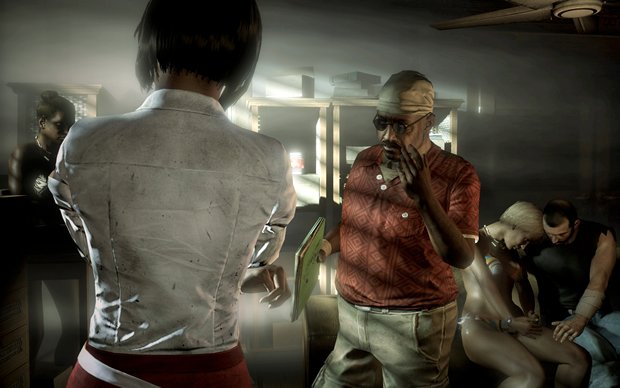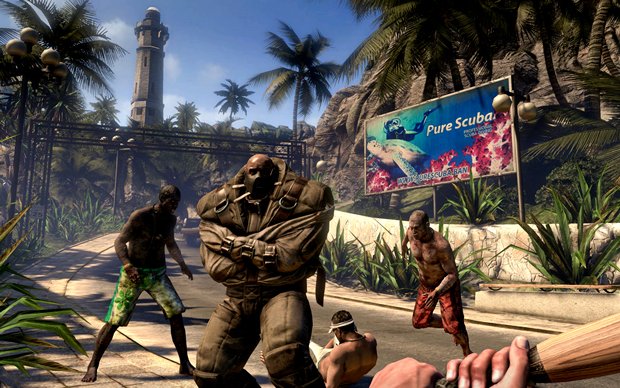The real story behind the Dead Island trailer video
We talk mocap, machinima and Memento with the creative genius behind the stunning trailer
We’re constantly inundated with marketing messages – on TV, the radio, and absolutely on the internet. So it’s rare for a trailer to seriously grab our attention, much less warrant several consecutive viewings. And when has that trailer ever been for a game we’ve barely heard of? But that’s just what Dead Island’s cinematic tour-de-force-in-reverse accomplished this past February. Twitter feeds clogged with links and praise, YouTube practically melted down, and Dead Island was suddenly the year’s most-anticipated game.
How did this happen? We’ve got the whole story, straight from the creators’ brains. But before we crack open the head of the creative mastermind behind this gem and feast on the goo inside, let’s review:
Amazeballs, right? We wanted to know every geeky detail about the trailer’s creation. To that end, we Skyped over to Europe to reach Anton Borkel, Dead Island’s cinematic producer, and Vincent Kimmer, brand manager.
GamesRadar: I wanted to focus today on the amazing trailer you guys released for Dead Island. Could you tell me a bit about the genesis of the idea? Did you cut a more traditional trailer and then decide it needed punching up? Or was the time shifting part of it from the start?
Anton Borkel: Actually the company started with some scripts earlier before I joined the project and we ended up using only a certain amount of these ideas and putting them into a completely new script, which had the editing techniques in there right from the start. We initially thought it would be a "cool" idea on paper, so when it was time to put it to the test in the early edits, we learned that we still had a long way to go.
GR: How long were you working on it?
AB: I joined the project in summer of 2010 and we've been working on it till the very last second before the release.
Weekly digests, tales from the communities you love, and more
GR: Getting the pace just right must have been a huge challenge. I'm sure the animators hated you every time you came back with a change.
AB: Interestingly enough, we had a good idea of what would work in the motion capture process. However, you always have a very different look when playing animations backwards. The human eye is too trained to see other humans so every small detail can end up looking awkward. So Axis, the company we worked with, actually did a re-shoot for some sequences that didn't turn out as we hoped. But the animators were great, they were actually very much psyched... everyone seems to love working with zombies.
GR: The trailer grabbed us from the very first shot. For a film geek like me, it immediately evoked the shower scene from Psycho with the closeup on the eye, and then it went all Coldplay: The Scientist. We’ve also heard comparisons to the film Memento. It felt like you had a diverse set of influences.
AB: Well, when you consider the game being part of the horror genre, there is a certain stigma when it comes to the potential audience, so we looked everywhere but horror games or horror films for influence. We tried to keep the visuals and even the gore as interesting as possible, to keep every viewer engaged the whole time. For example, when you look at the level of gore or violence being shown in the trailer, we certainly didn't cut back there but we tried to image elegant paintings and compositions with our shots.
GR: To go back to Hitchcock’s films, his horror worked on a deeply personal psychological level; gore is practically nonexistent (by today’s standards) and yet the films are terrifying. You’ve managed to have this intimate moment, yet still get in a few licks with the fire axe.
AB: Well we tried to play for both sides of the fence so to speak. But there were no other game trailers used as an influence because we tried to steer as far away from "classic" game advertisement as possible.
GR: I think that's a big part of what grabbed people, that it wasn't anything like typical game advertising.
AB: The melee, the combat, the gore... it's all there, but wrapped in an emotional story that tries to grab you, even if you don't care about violence at all.
GR: It touched people the same way that Gears of War "Mad World" trailer did. Obviously the games are nothing alike, but the trailers share a mood - loss, nostalgia, hopeless struggle against overwhelming odds...
AB: That is actually a very good example, it tries to generate the atmosphere first, rather than go straight to combat. The sense of struggle against overwhelming odds is actually one of the key reasons why we felt that the child would need to be in the trailer, even when it won't be part of the actual game.
GR: Do you worry that it will be difficult to maintain that intimate, visceral mood in a game where the player is spending all his or her time neck-deep in organs and meat?

Vincent Kummer: The trailer captures a certain moment in the game world, specifically the night of the zombie outbreak on the island. There will be situations that transport this certain mood, but there are also different elements in the game. So of course, when you’re in close combat with zombies fighting for pure survival the mood will be different. Exploring the island and finding the destruction the outbreak left, the mood will be closer to the trailer. We try to play different emotions throughout the game.
GR: Like a good film would. Speaking of, I understand there's been some interest from Hollywood. Anything you can talk about?
AB: No comment!
VK: We are in talks and thinking about what we want to do with the license, but nothing we can state at this point.
GR: I figured as much, still had to ask. Anton, can you tell me a bit about your background?
AB: I'm a 24 year old digital film and animation student that wrote some papers and honors thesis on cinematic use in modern day videogames. So this seemed like a match made in heaven when I joined the company to work on Deep Silver’s newer IPs.

GR: Sounds like a perfect fit.
AB: I was received with open arms and we can laugh about it now, but when you think of the idea, a sophisticated zombie short film trailer that has multiple story arcs and is being played out in reverse... I think it takes a really great understanding from all involved parties to not directly throw the idea and myself out of the window. I'm very grateful and I think everything turned out great.


